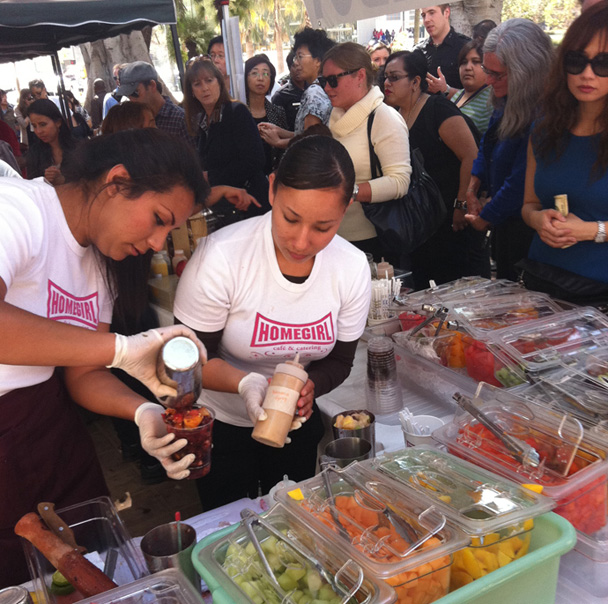Homeboy Industries in Los Angeles has all the right food trends covered. Its Homegirl Café showcases local, seasonal, sustainable ingredients. Its urban gardens yield heirloom tomatoes and squash blossoms and nopales for the café. Its Homeboy Bakery bread and treats like brownies and tarts are sold at local farmers’ markets. And it will soon have a café at LAX, airports being the latest frontier in innovative American eating experiences.
But none of this is about keeping up with the Chipotles. The slogan on the back of the cooks’ and servers’ and bakers’ T-shirts says it starkly: “Nothing stops a bullet like a job.” It’s the most direct mission statement imaginable for this nonprofit organization, which is devoted to ending street violence by giving gang members and other at-risk young people a fresh start after they get out of jail, or just by keeping them out of trouble. Participants first go through a job-readiness program, then get on-the-job training in one of Homeboy's several businesses.
Homeboy could simply train them to be potato peelers and dishwashers as some rehab programs might. But a passionate team keeps pushing the edible envelope with new opportunities. A small Homeboy Diner opened in L.A.’s City Hall this summer offering grab-and-go sandwiches and coffee. A newly hired lead baker from Chicago is expected to take the breads to a more artisanal level, with plans for 10 to 15 new products. And the urban gardens are turning L.A.’s concrete jungle a little greener, while teaching students the value of fresh vegetables and how to grow the produce themselves.
Up to 15,000 youths a year avail themselves of Homeboy’s many services, according to the founder, Father Greg Boyle, S.J., who says the goal is to “invest in people rather than endlessly try to incarcerate our way out of this problem.” A teenage mother who serves a prison sentence and goes back on the streets may just revert to her former life, but if she learns discipline and skills and how to stay drug-free while making and serving tacos, she could make a new life. Especially at a time when overcrowding and budget cutbacks may force California prisons to release felons early with little supervision, Homeboy has another mantra: “Jobs not jail.”
Los Angeles has the country’s biggest gang problem. But as Father Boyle wrote in Guideposts magazine: “They’re not natural-born criminals. They’re just out of options—no jobs in sight, dysfunctional schools and families, no sense of belonging in society.”
Even a job at McDonald’s may be the impossible dream for a young person with a prison record for drug or gun crimes. The 70 percent who finish Homeboy’s 18-month rehabilitation program come out with a résumé, references, and a new record—one that reflects their discipline and drug-free living. And a job-development office helps with placement not only within Homeboy but elsewhere in the food business, as well as in non-culinary industries such as retail and solar installation.
“Father Boyle is teaching the least-employable folks in L.A. how to care about what they do, and how to get and keep jobs,” says Jonathan Gold, restaurant critic for LA Weekly. “The food industry tends to have lower barriers to entry, and is always local. His genius was realizing that.”
It sounds like a feel-good story, but the reality has bite. Ask Homegirl Café chef Pati Zarate and manager Erika Cuellar if working with troubled girls is challenging and they respond in unison: “You think?”
“Running a restaurant is a labor-intensive job, and even more than that you have the training going on when you’re prepping for the day,” Zarate says. “It’s daily, daily training.”
Cuellar amplifies: “You can train someone to slice a tomato, and for the next three months you will go over it every day. With the damage from drug use and abuse and violence, they are often mentally not able to hold the knowledge. Even coming to work is difficult when their lives are chaotic.”
Marco Di Dionisio, project manager for Homeboy’s farmers’ market division, notes another challenge: “They could be earning $2,000 a week dealing drugs or arms or stealing cars, and here they’re working for $9 an hour. That takes dedication.”
An even bigger issue, he adds: “You’re going to be working side by side with people who were your enemy. One guy shot another’s brother, and we put them side by side in the lineup in the bakery.”
Cuellar concurs: “Girls who were once out to kill each other are now harvesting cilantro together.”
That training to totally shed previous lives is one reason Homeboy’s food businesses are not simply moneymakers. They are also a way of spreading the word of the good its other programs can do. (The organization does not recruit but wants gang members to enroll of their own volition.) “We have the guys out in 27 farmers’ markets because it gets the knowledge out there,” Di Dionisio says. “We tell them to sell the cause before the bread. Give them a flyer, talk about the cause.”
And that’s important, because Homeboy was in dire straits only a year and a half ago, when it ran so low on money it had to lay off 300 employees. “We’re in way better shape now,” Father Boyle says. “People responded. But in this climate we’re just keeping ourselves afloat. I’d love to have revenue be doubled” from the businesses.



 Pinterest
Pinterest


